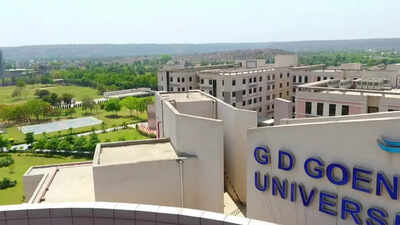- News
- City News
- gurgaon News
- Students protest against namaz on football field at Gurugram's GD Goenka University
Students protest against namaz on football field at Gurugram's GD Goenka University

GD Goenka University (Official website: www.gdgoenkauniversity.com)
GURUGRAM: From the streets, where a concerted campaign against namaz in public places was spearheaded by right-wing groups last year, opposition to prayers in the open has reached a university campus.
A group of students at GD Goenka University on Sohna Road filed a complaint with the registrar earlier this week against some international students for offering prayers on the football field of the campus.
The foreign students had congregated on August 30 afternoon, following which the protesting group apparently raised "Jai Shri Ram" slogans. A video clip, purportedly of the protest, shows the students' group shouting, "Ek hi naara, ek hi naam, Jai Shri Ram, Jai Shri Ram (one slogan, one name, Jai Shri Ram)".
In their complaint to the registrar, the students condemned prayers in the open. The complaint read, "If they want to offer namaz, then they should go to the allotted hostel room." It added that there should be classes on Fridays for all students and no one should get a proxy to offer namaz.
The university said it was a one-off incident which was "handled timely and put to rest by a thorough dialoguing between both parties".
"A group of students had taken permission to play football on the ground. And while they were playing the game, they realised it was their prayer time, so they just sat and offered their prayers. A group of students objected and said it is not allowed here. And they countered that they had taken permission. The permission was to play on the field, not to offer prayers," registrar Dr Dhirendra Singh Parihar said on Saturday.
Speaking to TOI, university officials blamed the incident on a communication gap with the international students, who are not fluent in English or Hindi, and the backdrop that protests last year against namaz in Gurgaon had provided, besides continuous social media posts on the issue.
"But all that was resolved when we talked to both parties and explained we are a religion-neutral university and no such special permission has been given to anybody. We also apprised the students of African origin about the sensitivity of the issue in this region and the matter was put to rest," said Parihar.
"Our college is very close to the Mewat region, and for a while now, this issue has been circulating in different forms across various platforms. So, it is bound to influence the minds of certain young students. Instead of treating one party as right and another as wrong, we got to the root of the issue, which was miscommunication. A fair dialogue involving senior students resolved the issue. There was nothing before those 10 minutes and nothing after that. And we'd like to keep it that way and focus only on topics concerning academics and welfare of students," Parihar added.
A group of students at GD Goenka University on Sohna Road filed a complaint with the registrar earlier this week against some international students for offering prayers on the football field of the campus.
The foreign students had congregated on August 30 afternoon, following which the protesting group apparently raised "Jai Shri Ram" slogans. A video clip, purportedly of the protest, shows the students' group shouting, "Ek hi naara, ek hi naam, Jai Shri Ram, Jai Shri Ram (one slogan, one name, Jai Shri Ram)".
In their complaint to the registrar, the students condemned prayers in the open. The complaint read, "If they want to offer namaz, then they should go to the allotted hostel room." It added that there should be classes on Fridays for all students and no one should get a proxy to offer namaz.
The university said it was a one-off incident which was "handled timely and put to rest by a thorough dialoguing between both parties".
"A group of students had taken permission to play football on the ground. And while they were playing the game, they realised it was their prayer time, so they just sat and offered their prayers. A group of students objected and said it is not allowed here. And they countered that they had taken permission. The permission was to play on the field, not to offer prayers," registrar Dr Dhirendra Singh Parihar said on Saturday.
Speaking to TOI, university officials blamed the incident on a communication gap with the international students, who are not fluent in English or Hindi, and the backdrop that protests last year against namaz in Gurgaon had provided, besides continuous social media posts on the issue.
"But all that was resolved when we talked to both parties and explained we are a religion-neutral university and no such special permission has been given to anybody. We also apprised the students of African origin about the sensitivity of the issue in this region and the matter was put to rest," said Parihar.
"Our college is very close to the Mewat region, and for a while now, this issue has been circulating in different forms across various platforms. So, it is bound to influence the minds of certain young students. Instead of treating one party as right and another as wrong, we got to the root of the issue, which was miscommunication. A fair dialogue involving senior students resolved the issue. There was nothing before those 10 minutes and nothing after that. And we'd like to keep it that way and focus only on topics concerning academics and welfare of students," Parihar added.
FOLLOW US ON SOCIAL MEDIA
FacebookTwitterInstagramKOO APPYOUTUBE
Start a Conversation
end of article









